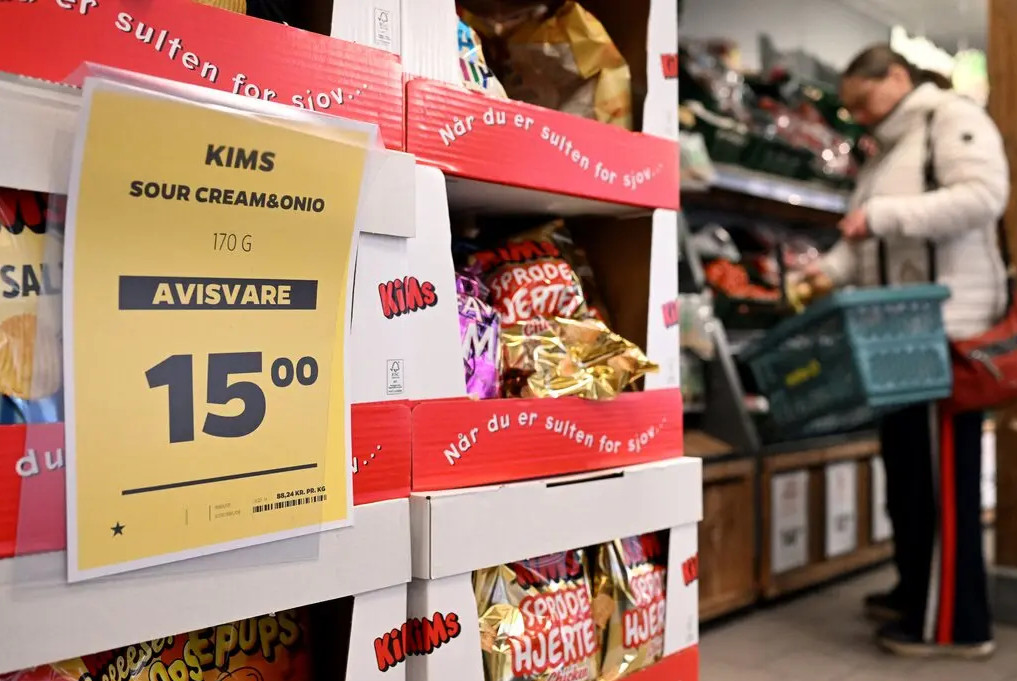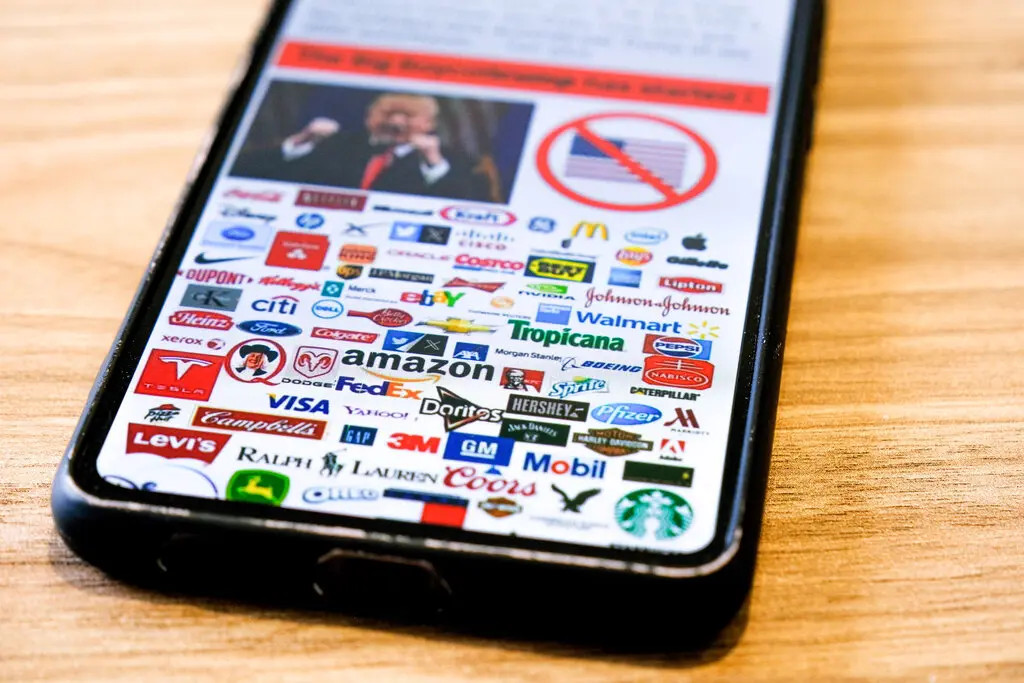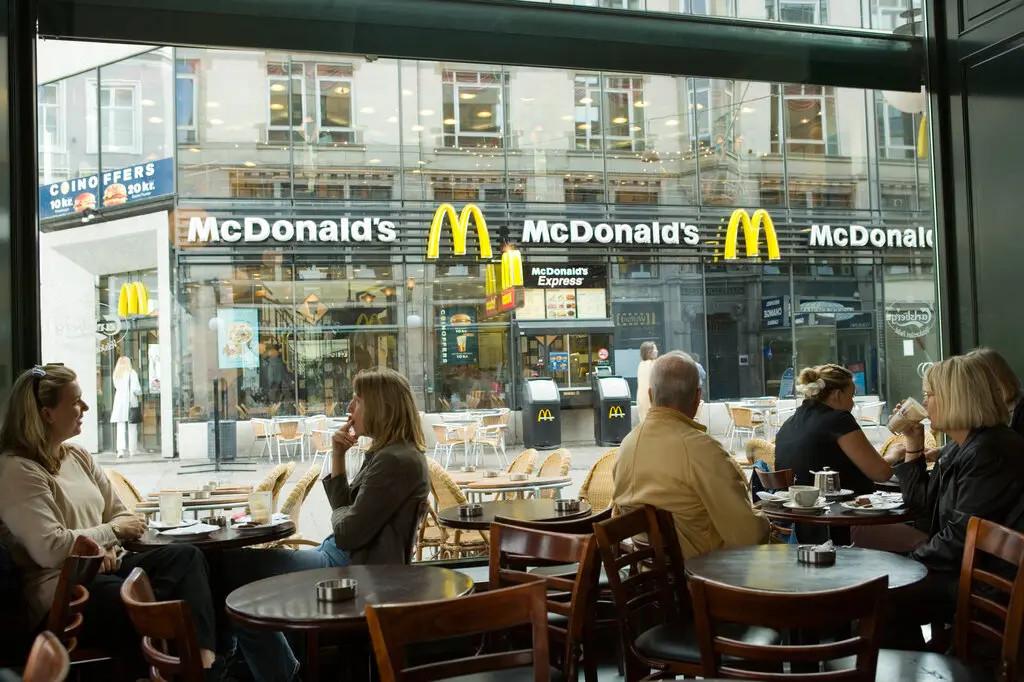
Date: 2026-03-04 Page is: DBtxt003.php txt00028266
TRUMP'S STUPID TRADE STRATEGY
WILL LIKELY GO VERY BADLY FOR THE USA!
Why Shoppers Abroad Are Boycotting U.S. Goods. A growing number of
Europeans and citizens of other countries are choosing not to buy
American products to demonstrate their anger at Trump’s policies.
WILL LIKELY GO VERY BADLY FOR THE USA!
Why Shoppers Abroad Are Boycotting U.S. Goods. A growing number of
Europeans and citizens of other countries are choosing not to buy
American products to demonstrate their anger at Trump’s policies.

Some Danish grocery stores added stars to the price tags of
European goods to help customers identify local products.
Credit...Sergei Gapon/Agence France-Presse — Getty Images
Original article: https://www.nytimes.com/2025/03/21/world/europe/europe-boycott-american-products-trump.html
Peter Burgess COMMENTARY
I migrated to North America from the UK about 60 years ago. I had just married Madeline, a delightful young lady who had an interesting family background. Her father had an Irish background. Her mother was Lebanese. My new wife was born in Cairo, Egypt where her father was the manager of a Shell fuel depot. The family was in a 'good social and economic position' until it wasn't.
When Gamal Abdel Nasser took power in Egypt in 1952 my wife's big family was forced to flee and initially settled in the UK. One brother remained in the UK with his new family while the others all migrated to Canada where they eventually settled in Montreal.
Madeline initially trained as a nurse, but changed from working in healthcare to working in the corporate world after the family move to Canada. When I met her in London, she had moved from Montreal to Vancouver and was the proud owner of a white Triumph TR4 sports car! In London, when I met her, she was working as the Personal Assistanct (Secretary) to the President of a quite large public company. Compared to the other women of her age in London at the time, she was an interesting delight with a world view that got my attention! Unlike fashionable young women in London at the time we lived there, she had a world view that was very different from the 'horsey' crowd that went to the country every weekend to groom and ride their horses!
I had learned something about North America several years before meeting Madeline. As a student, I had visited Canada and the USA in my summer vacations in 1960 qand 1961 as a member of the Cambridge Canada Club!. The Club chartered two Air France Boeing 707s to carry a planeload of Cambridge students from London Heathrow to New York Idlewild (now New York JFK) in June and return in September. As students we were allowed to 'work' in Canada but not in the United States. If I remember rightly, we paid 75 poinds sterling for the return flight. This low fare was possible because the planes were operating empty going West in June and empty going East in September a result of a massive differential between the wealth of Europeans and Americans. At that time, many Americans could afford to vacation in Europe during the summer, while Europeans could not afford to visit North America.
I learned a lot during these two trips to North America. As much as anything was the way in which these two trips outside the UK gave me a world view and perspective that has been extremely valuable. Nothing that happened negated what I had learned in an academic setting at school and univesity, but it served to put it all into a context that has served me well for now upwards of six decades!
Madeline and I migrated to Canada in the mid-sixties soon after I completed my training as a Chartered Accountant with Cooper Brothers & Co. in London. We spent a few days in Montreal with her parents bafore setting out by train ... Canadian National ... for Vancouver, British Columbia. It was February. I learned very fast that winter in Canada was a different experience than winter in the South of England! I still have a memory of getting out of the train in Saskatoon, Saskatchewan ... only to be admonished by the train guard because of the active danger of frostbite.
When the train got to the Rockies about a day and a half later, one of the locomotives pulling the train had a failure of some sort and we were stuck until a rescue engine could come to our aid. It was about a day and a half before the train was able to move. Fortunately there was adequate heat and food ... and the scenery In the Jasper National Park was spectacular.
Travelling by air over long distances may be more 'efficient' but far less interesting.
Last year ... no, actually 2023, I helped drive my daughter from Denver to Eastern Pennsylvania in her truck. It was hard work, but very very interesting and a great reminder of the deep diversity of the American people and places.
Good memories!
Peter Burgess
A growing number of Europeans and citizens of other countries are choosing not to buy American products to demonstrate their anger at President Trump’s policies.
Written by Jenny Gross Reporting from London
March 21, 2025
Want to stay updated on what’s happening in Denmark, France and Greenland? Sign up for Your Places: Global Update, and we’ll send our latest coverage to your inbox. Bo Albertus, a school principal in Denmark, finds the Spanish raisins he now snacks on less tasty than his favorite Sun-Maid ones from California. There is no perfect substitute for Heinz tomato soup, a staple in his pantry. And he misses Pepsi Max.
But as long as President Trump pursues policies that Mr. Albertus, 57, believes put Europe’s economy and security at risk, he will boycott these and other U.S. products. He is one of a growing number of Europeans, Canadians and others who are forgoing American goods to show their anguish and dismay at Mr. Trump’s treatment of longtime allies.
“I felt a sense of powerlessness,” said Mr. Albertus, who is an administrator of a Danish Facebook group dedicated to boycotting American goods that has 90,000 members. “We all feel that we are doing something,” he added. “We are acting on our frustration.”
The strongest momentum behind such consumer action appears to be in countries that Mr. Trump has directly antagonized, like Denmark, whose territory of Greenland he has threatened to take, and Canada, which he has repeatedly said should become America’s 51st state.
But as Mr. Trump embraces President Vladimir V. Putin of Russia and imposes tariffs on European goods, groups dedicated to boycotting U.S. goods and swapping tips on local alternatives have popped up in several European countries.
In a Swedish Facebook group with over 80,000 members, users ask for tips on buying non-American laptops, dog food and toothpaste. Members of a French group sing the praises of European laundry detergents and smartphone apps, and debate whether Cognac or Scotch whisky is the better alternative to bourbon.
There are also detailed discussion threads about what exactly constitutes an “American” product — does Coca-Cola manufactured in Europe count, or ice cream from Ben & Jerry’s, now owned by the British company Unilever? — that illustrate how boycotts in an era of globalized commerce are far from straightforward. But the groups are mostly a place for anxious Europeans and others to share stories and vent about their opposition to U.S. policies.
Majken Jensen, 49, a coordinator for a government agency in Copenhagen, acknowledged that many millions of people buy U.S. products worldwide, and boycotts by some consumers in a few countries may not make a huge difference, at first. Still, she has stopped buying Oreos and Heinz ketchup, and has swapped Estée Lauder night serum for a local brand, Beauté Pacifique.
“I’m not even a drop in the ocean,” she said. “But that’s my little way to protest.”
Ms. Jensen emphasized that her decision to stop buying U.S. goods was in opposition to the Trump administration, not the American people. “We want our friends back,” she said.

A movement to boycott U.S. goods has gained momentum as President Trump pursues
policies that many Europeans say put the continent’s security and economy at risk.
Credit...Nicolas Guyonnet/AFP--Getty Images
The backlash has led some stores to implement changes that make it easier for customers to identify local products. Canada’s largest grocery chain, Loblaw, is using a “T” symbol to denote U.S.-made products that are more expensive because of retaliatory tariffs Canada recently put in place. In Denmark, the grocery store chains Netto, Bilka and Fotex added stars to the price tags of European goods after customers requested clearer labeling, their parent company said.
Elisabeth Braw, a senior fellow at the Atlantic Council, said that social media and the interconnected global economy gave consumers more of a voice than ever before.
“America has done many questionable things over the years,” she said, “but I don’t think even the Vietnam War could have triggered a campaign like this, simply because social media was not available.”
Business leaders are aware of the potential costs. Beyond Meat, the plant-based food company with headquarters in California, warned in its latest financial report that it could lose customers internationally because of “anti-American sentiment.”
Michael Medline, the chief executive of Canada’s second-biggest supermarket company, Empire, said this month that the company’s sales of U.S. products were “rapidly dropping” because of a growing demand for non-American products. That decline will continue as the company sources more products from countries other than the United States, the company said, as Canada’s retaliatory tariffs make U.S. goods more expensive to import.

A McDonald’s in Copenhagen, Denmark. The strongest momentum behind consumer action
appears to be in countries that Mr. Trump has directly antagonized, like Denmark.
Credit...Education Images/Universal Images Group, via Getty Images
The Swiss chocolate maker, Lindt, said this month that in Canada, it would start selling chocolate made in Europe rather than the United States, both to avoid tariffs and to reduce the risk of a consumer backlash.
One of the hardest-hit American brands abroad may be the electric carmaker Tesla, whose chief executive, Elon Musk, has become a key figure in Mr. Trump’s administration. He has also promoted far-right parties in Europe on X, the social media platform he owns. In Germany, Europe’s largest market for electric vehicles, sales of Tesla cars fell 76 percent in February compared with a year earlier, according to the German Association of the Automotive Industry.
Boycotts have hit the digital world, too, with consumers saying they have canceled subscriptions to Netflix, Disney+, Amazon Prime Video and other streaming services — even though substitutes with similar offerings were not easy to find. Mr. Albertus subscribed to Viaplay, a Swedish streaming service, where he recently started watching “Monk.” “It’s an American series, but life isn’t perfect,” he said.
Mads Mouritzen, who began the Danish Facebook group, said he had deleted his accounts on Airbnb and Hotels.com, and had stopped using Google and Microsoft Office. (He justified his use of Facebook, based in California, as a platform for the group because it was the easiest way to reach the most people.)
“It’s very important to say we still like the Americans, we still like the country,” he said. “There’s a current situation that we don’t like, and there’s a current administration we don’t like.”
Mr. Mouritzen, a 57-year-old janitor, said he hoped relations between the United States and Europe would eventually get back to where they were. But if that takes time, Mr. Mouritzen is prepared: He has a stockpile of 12 bottles of American-made Tabasco hot sauce, the one thing he can’t live without, purchased just before he started the boycott.
The Changing Economy
Bourbon Is Banned, California Wine Canceled, as Canada Pulls U.S. Alcohol ... March 6, 2025
Tesla for Sale: Buyer’s Remorse Sinks In for Elon Musk’s E.V.-Owning Critics ... March 3, 2025
More on Trump’s Tariffs
- Canada’s Small Businesses: A rice mill in Ontario is among many small businesses being hit by President Trump’s tariffs and also by Canada’s retaliatory levies, putting their futures in doubt.
- Boycotting U.S. Goods: A growing number of Europeans and citizens of other countries are choosing not to buy American products to demonstrate their anger at Trump’s policies.
- Europe Delays Tariffs: European Union officials are delaying their retaliation against Trump’s steel and aluminum tariffs until mid-April, aiming to refine the list of products that will be hit while also allowing more time to strike a deal.
- New Tariff ‘Number’: The Trump administration plans to confront countries around the world with a reciprocal tariff “number” on April 2, a figure that will reflect what the White House considers the cost of foreign trade barriers, Treasury Secretary Scott Bessent said.
- Boeing and the Aerospace Industry: Companies in the industry are big exporters but also very reliant on a global supply chain, making them vulnerable.
- The Trump administration’s previous actions on North American tariffs ... March 11
- Notified Canada that its citizens would need to register when crossing the border into the United States › ... March 11
- Walked back plans to double metal tariffs on Canada after escalating threats › ... March 6
- Suspended many of the tariffs imposed on Canada and Mexico › ... March 5
- Paused tariffs on cars from Canada and Mexico for a month › ... March 5
- Accused Prime Minister Justin Trudeau of Canada of imposing tariffs on the U.S. “to stay in power” › ...
See every major action by the Trump administration
Editors’ Picks
- 14 Easy Recipes Because You Want to Eat More Fish
- Classic Private-Eye Detective Novels: A Starter Pack
- Why Are Women Drawn to These ‘Unflattering’ Pants?